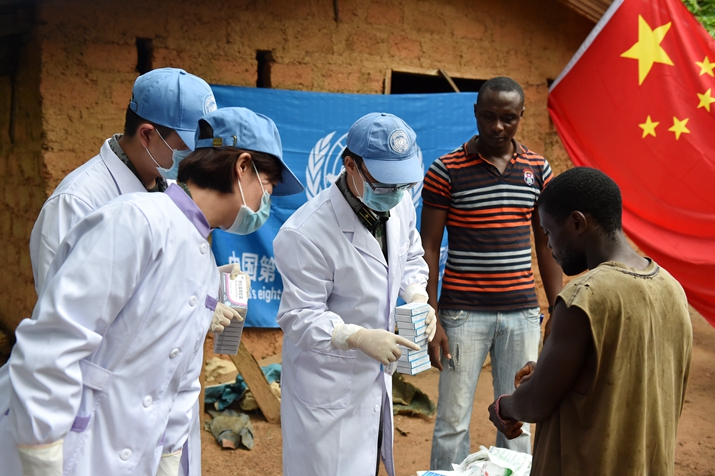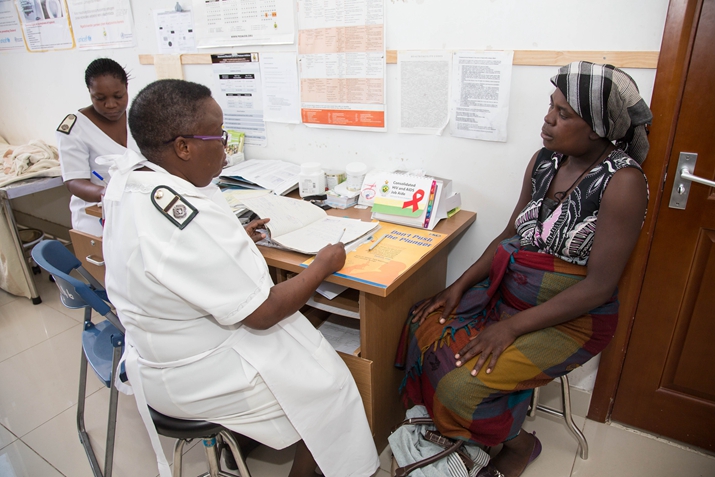|
||||||||||
| Home Nation World Business Opinion Lifestyle ChinAfrica Multimedia Columnists Documents Special Reports |
|
||||||||||
| Home Nation World Business Opinion Lifestyle ChinAfrica Multimedia Columnists Documents Special Reports |
| ChinAfrica |
| Health cooperation is a core part of Africa-China relations |
| The story of developing Africa's healthcare system sits at the core of Africa-China relations |
| By Benard Ayieko VOL.12 August ·2020-08-06 |

The 18th batch of Chinese peacekeepers of the United Nations peacekeeping mission in Liberia provides voluntary consultation for local villagers on November 1, 2015 (XINHUA)
At least half of the world's population, approximately 3.9 billion people, still does not have full access to basic health services, with the largest percentage of the affected population coming from the least developed and developing countries, mainly in Africa, according to the World Health Organization (WHO). It said that the situation is made worse by the revelation that about 100 million people cannot afford to pay for their basic healthcare services, ostensibly because they are sliding into the extreme poverty zone, living on just $1.9 or less a day.
With over 930 million people, nearly 12 percent of the world's population, spending at least 10 percent of their household budgets to pay for essential health services, the call by the UN member states to achieve universal health coverage by the year 2030, as part of the Sustainable Development Goals (SDGs), could not have come at a better time.
The story of developing Africa's healthcare system sits at the core of Africa-China relations. It is partly informed by the fact that most healthcare systems in Africa suffer heavily from neglect and underfunding across the six WHO pillars of healthcare delivery. It is for this reason that China has scaled up its health cooperation with Africa. The Beijing Summit of the Forum on China-Africa Cooperation (FOCAC) held in 2006 set the ball rolling by introducing measures to broaden bilateral cooperation, particularly on medical care and public health. The focus on healthcare cooperation between China and Africa was reiterated at the FOCAC Johannesburg Summit held in 2015 in South Africa, which listed public health cooperation as a priority area. This meeting attracted the participation of health ministers from China and more than 40 African countries, representatives from the African Union, the WHO and the Joint United Nations Program on HIV/AIDS. China's health assistance to Africa has mainly been in the form of building hospitals and medical care centers, establishment of malaria prevention and treatment centers, dispatching medical teams for experience sharing, training medical workers and providing medicines and other medical materials.
Health infrastructure
The Africa-China healthcare cooperation dates back to 1963, when more than 100 Chinese healthcare personnel were first sent to Algeria to work and exchange knowledge and skills with their local counterparts. Over the years, Africa has been undergoing profound transformation linked to the diversification of healthcare practices and the emergence of a new political agenda aimed at strengthening health systems to enforce equity in accessing healthcare services.
For example, last year, China officially handed over a state-of-the-art hospital – Kenyatta University Teaching, Referral and Research Hospital – to the Kenyan authorities. This world-class medical facility has a 650-bed capacity fully financed by Chinese concessional loans and is one of the medical facilities that is supporting the treatment and recovery of COVID-19 patients. The construction of Mama Lucy Kibaki Hospital – named after the late Lucy Kibaki, Kenya's former first lady, is another hospital that was built by the Chinese at a cost of $6.4 million, that doubles up as a medical facility and a malaria treatment center.
Many countries in Africa have received Chinese support in constructing new medical facilities or modernizing existing ones so they are fully equipped with new machineries and equipment to support evidence-based treatment of patients. For instance, China has helped South Sudan upgrade and expand 26 health facilities with a $33-million grant. Cognizant of the often non-existent or depleted healthcare infrastructure in Africa, China has also been instrumental in the construction of community clinics and treatment centers, along with facilities to fight infectious diseases in African countries like the Democratic Republic of the Congo, Cameroon, Togo, Cote d'Ivoire and Namibia, among others. These are all ultramodern medical facilities equipped for emergencies, resuscitation, pediatrics, surgery, obstetrics and gynecology and medical imaging.
According to figures from the Chinese Government, more than $117 million in medical equipment and drugs to treat diseases such as malaria have been provided. Many medical facilities in Africa are stocked with modern medical equipment, medicine, health supplies, stationery and other health consumables courtesy of the Chinese Government. This support has enabled many newborns and children under the age of 5 on the continent to access vaccines for diseases such as hepatitis B.
China has also been working with African governments to build their own capacity to achieve universal health coverage, with a focus on technology transfers and pharmaceutical capacity building around essential high-quality medicines. The Chinese technological innovation in bioengineering and production has created efficiency in the supply chain, effectively improving the methods of drug research development and reducing the cost of pharmaceutical products on the continent.

China-Zimbabwe Friendship Hospital, built under a Chinese aid project,helps Zimbabwe provide quality health services in the countryside (XINHUA)
Personnel training
But more than just the assistance in infrastructure, drugs and equipment, China has played a key role in training more than 3,000 medical personnel in Africa, including the deployment of medical teams in more than 50 countries, treating more than 200 million patients, according to Chinese Government data. In order to address and help close the knowledge and skills gap that exists in the health sector, China has sent over 20,000 medical personnel to work in various medical facilities on the continent to build capacity in early detection and treatment of tropical and infectious diseases. The Chinese medics are also involved in research of vaccines to combat diseases prevalent in sub-Saharan Africa. This capacity-building initiative has seen many talented African students rewarded with scholarships and training opportunities to study health sciences in China.
The Africa-China healthcare cooperation may just be what the doctor ordered, and affords the continent ample opportunity to reap the benefits of the Ministerial Forum on China-Africa Health Development, which set a clear roadmap for jointly addressing key health challenges afflicting the continent. CA
(Print Edition Title: Creating Medical Capacity)
* Comments to zanjifang@chinafrica.cn
| About Us | Contact Us | Advertise with Us | Subscribe |
| Copyright Beijing Review All rights reserved 京ICP备08005356号-5 京公网安备110102005860号 |